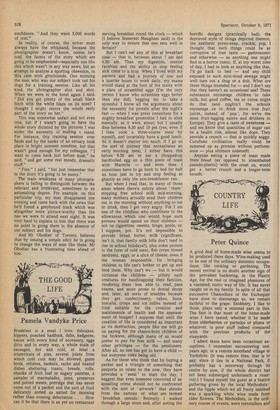Pamela Vandyke Price
Breakfast is a meal I love: fishcakes, kippers, poached haddock, dabs, kedgeree, bacon with every kind of accessory, eggs ditto and in every way, a whole scale of sausages, hot and cold, at least a triumvirate of pies, several joints from which cold cuts may be slivered, game birds, relishes, baskets, racks and heated dishes sheltering toasts, breads, rolls, chunks of fruit loaf or sugary pastries, a sampler of marmalades, jams, preserves and potted meats, porridge that has never come out of a packet and the sort of fruit delicately sorted as suited for morning rather than evening delectation . . . How can it be that there is as yet no restaurant serving breakfast round the clock — which (I believe Somerset Maugham said) is the only way to ensure that one eats well in Britain?
But I can't eat any of this at breakfast time — that is, between about 7 am and 9.30 am. Then my digestion, mental faculties and the ability to stop feeling sick come to a stop. When I lived with my parents and had a journey of one and a quarter hours to work daily, my mama would stand at the foot of the stairs with a plate of scrambled eggs (I'm the only person I know who scrambles eggs better than she did), begging me to take a spoonful. I know all the arguments about the necessity for protein after the night's fast — when I was press consultant for a mighty breakfast promotion I had to slink mentally, as it were, about; but I usually dine between 8.30 and 10 pm (yes, even if I then cook a three-course meal by myself), and invariably have a good lunch. So it doesn't matter too much. If I go on the sort of journey that necessitates an early morning meal, I either have this before 6.30 am or eat a chopped-up hardboiled egg on a thin piece of toast with Marmite — and even then I sometimes have to go back to bed for half an hour just to try and stop feeling as ghastly as only the non-breakfaster can.
But when I read that, in many of those areas where there's outcry about 'them ' stopping free school milk mid-morning, many mothers actually send their children out in the morning without anything to eat br drink, then I get very angry. For I am one of the childless who contribute to the allowances which one would hope such persons would spend on their children — not on cigarettes, sweets, bingo, pools, or, I suppose, pot. It's not impossible to provide bread, butter, milk (significant, isn't it, that family milk bills don't tend to rise in school holidays?), plus some protein in the form of cold meat, fish (even tinned sardines), eggs, or a slice of cheese, even if the woman responsible for bringing children to life can't bother to get up and feed them. Why can't we — but it would victimise the children — pillory such creatures for handicapping their families, rendering them less able to read, pass exams, and more prone to dental decay and, later, all sorts of troubles because they get confectionery, cakes, buns, biscuits, crisps and ice lollies instead of food suitable for the creation and maintenance of health and the appeasement of •hunger? I suppose that until the creation of life is considered as important as its destruction, people like me will go on paying for the chance-born children of the feckless, although many of us would prefer to pay for free milk — and many other privileges — for the pensioners. After all, no one has got to have a child — but everyone risks being old.
As for those who think that by buying a packet and a triangle of something that purports to relate to the cow, they have provided a ' meal ' to start the day, I suggest that even someone convicted of an appalling crime should not be confronted with the sort of ' artwork ' that shrieks from the cartons of what are termed 'breakfast cereals.' Recently I walked through a large store and, after noting the horrific designs (practically bad), the depraved style of things depicted thereon, the aesthetic porno-snap, crackle, pop, I thought that such things could be as corruptive of true taste — gastronomic and otherwise — as anything one might find in a horror comic. If, at my worst time of day, I had to look at anything like that, I'd go back to bed — and any child exposed to such mini-mind sewage might well turn out a thug or a dolt. What are these things intended for — and I don't say that they haven't an occasional use? These substances encourage children to take milk, but good coffee, tea or cocoa might do that (and mightn't the schools encourage us to drink more true fruit juices, instead of ' pop ', for we're the most fruit-lagging eaters and drinkers in Europe). They give a taste of sweetness — and we know that quantities of sugar can be a health risk, almost like dope. They provide a crunch — that is quickly soggy. Cornflake civilisation really could be summed up as promise without performance — plus ultimate unbenefit.
Anyone eating a piece of toast made from bread (as opposed to steambaked pseudo-plastic) with the crust on, would get a better crunch and a longer-term benefit.










































 Previous page
Previous page